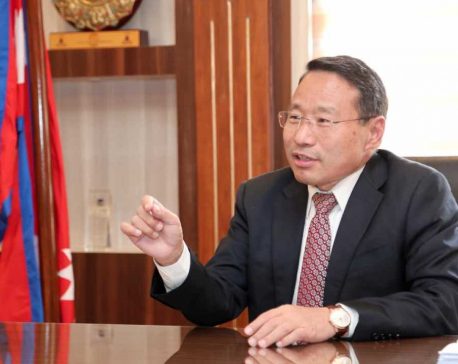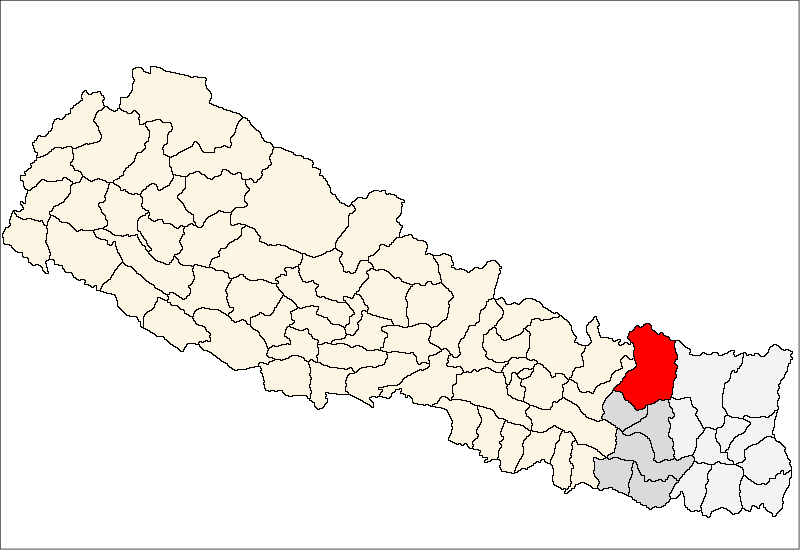
OR
#Interview
'LDCs' concern about the potential loss of concessional financing following their graduation does not hold much water'
Published On: August 6, 2023 01:45 PM NPT By: Republica | @RepublicaNepal

Dr. Ratnakar Adhikari has held the position of Executive Director at the Executive Secretariat for the Enhanced Integrated Framework at the World Trade Organization in Geneva since October 2013. Before assuming this role, Dr Adhikari served as the Chief Executive Director of South Asia Watch on Trade, Economics, and Environment (SAWTEE), a prominent regional think tank based in Kathmandu. Throughout his career, he has undertaken various significant roles, including Senior Adviser to the National Planning Commission of the Government of Nepal and Trade Programme Specialist for the United Nations Development Programme, Asia Pacific Regional Centre in Colombo, Sri Lanka. Dr. Adhikari's expertise spans multiple fields, with extensive research and publications in international trade, regional economic integration, Aid for Trade, competition policy, and intellectual property rights, particularly from the perspective of the Least Developed Countries (LDCs). During his recent visit to Nepal, Republica's Kosh Raj Koirala had the privilege of engaging in an interview with him, covering a range of topics pertaining to Nepal, especially in light of the post-LDC graduation scenario. Here are some excerpts from the conversation:
Republica: Nepal aims to transition from an LDC to a middle-income country by 2026. What opportunities and challenges do you foresee for Nepal in the post-graduation period?
Dr Adhikari: Before speaking of the opportunities beyond graduation from LDC status being a matter of national pride, let me highlight the perceived challenges, not least because opportunities emanate from those very challenges.
Two key challenges perceived by the LDCs are the loss of preferential market access for export and development assistance, such as concessional financing. However, a deeper analysis reveals that such concerns are not fully backed by evidence.
In the areas of market access, an analysis by the World Trade Organization (WTO) and the Enhanced Integrated Framework (EIF) shows that only a handful of LDCs, led by Bangladesh, which have managed to effectively utilize these trade preferences, tend to lose heavily. However, in the case of Nepal, which has limited preference utilization, the likely loss will be to the tune of USD 7 million, which is less than 1% of the total exports of Nepal.
In the area of development cooperation, the LDCs' concern about the potential loss of concessional financing following their graduation also does not hold much water. This is because the same analysis shows that major donors, particularly the multilateral ones, such as the World Bank and the Asian Development Bank, consider, among other things, income criteria rather than LDC criteria for such financing. And several donors have also indicated that they will not necessarily reduce financing to the LDCs just because they graduate from the LDC category. Moreover, development assistance depends, among other things, on several geopolitical, historical and regional considerations.
In terms of opportunities, there is a possibility of reducing reliance on trade preferences, which can be done in three different ways: first, by enhancing competitiveness through productive capacity-building and addressing supply-side constraints; second, by reducing trade costs, such as through the implementation of paperless trade modality and reducing bureaucratic formalities while trading across border; and third, by signing preferential trade agreements with major trading partners, such as Australia, Japan and Turkey. This also entails negotiating the addition of a few more products of export interest to Nepal benefitting from the existing preferential access to the U.S. market.
Moreover, the European Union provides additional duty-free access to the LDCs for three years after graduation and provides Generalized System of Preference Plus (GSP+) benefits to several countries, including Nepal's regional neighbors, such as Pakistan and Sri Lanka, which attracts much lower tariffs. Nepal can also benefit from such preferences by fulfilling some of the social and environmental requirements for accessing such facilities.
Loss of concessional financing, if at all, can be converted into opportunity by mobilizing more private finance, including foreign direct investment (FDI), and utilizing various forms of development assistance, including Aid for Trade, to leverage additional resources. There is also a possibility of leveraging various forms of innovative financing, such as blended finance and impact investment, which needs to be explored.
What steps can Nepal take to continue receiving preferential market access?
Although the LDCs as a group have submitted a proposal to the WTO, this is still under consideration by the WTO members. Discussions seem to be moving in the right direction, yet nothing can be said with certainty at this stage. What I know is that Nepal has been playing an active role at the WTO as a part of the WTO LDC Group to secure continued preferential access as well as other special and differential treatment accorded to the LDCs.
Could you share experiences from other LDCs that have graduated? How are they coping with the transition?
Several graduated and graduating countries have not only put in place smooth transition strategies but also implemented them in practice. These are the countries that are going to reap the benefits of graduation or minimize the perceived impact of graduation (howsoever one looks at it), compared to those that have not done much beyond debating whether or not graduation supports the development aspirations of the country. Examples of countries in the Asia-Pacific region, where the majority of the LDCs are graduating, are particularly instructive.
Vanuatu, which graduated in 2020, has put in place an electronic single window system and installed a paperless trade system. These actions resulted in reduction in document processing time from 6 days to 10 minutes and, in turn, substantially reduced their trade costs and augmented revenue, thanks to increased transparency. Vanuatu's Department of Customs and Inland Revenue has reported an impressive increase in revenue collection from around USD 33 million in 2016 to a current value of USD 134 million since the implementation of the single window. Impressed with the success of the initiative, Vanuatu's Parliament recently approved the budget for its continuity into the next phase.
In Bhutan, which is graduating in 2023, the Department of Industry developed and launched the e-Regulation Portal – an online portal containing trade, investment and construction related information and procedures. The Portal, which is a serious effort to enhance transparency of investment rules, regulations and procedures, is also included in the websites of Bhutanese Missions and Embassies abroad.
Between the launch of the Portal during the COVID-19 pandemic time (November 2020 and August 2022), the Division of Foreign Investment was able to swiftly approve 104 domestic and FDI investment projects worth USD 365 million.
In Bangladesh, which is set to graduate at the same time as Nepal (in 2026), the Bangladesh Garment Manufacturers and Exporters Association (BGMEA) launched the Center of Innovation, Efficiency and Occupational Safety on 18 November 2022. The Center is expected to act as a knowledge hub for advanced technology, including Industry 4.0; global best business practices in the apparel sector; and latest trends of the global fashion industry. The objective of the Center is to help BGMEA member enterprises embrace digital technology, enhance competitiveness and efficiency, reduce trade cost and improve compliance with social/environmental norms.
Cambodia, which has met the graduation criteria for the first time in 2021 and may only graduate after Nepal and Bangladesh, has concluded several regional and free trade agreements in the past couple of years. While the country ratified the Regional Comprehensive Economic Partnership Agreement in 2022, its bilateral free trade agreements signed with China and South Korea came into force in the same year. Finally, Cambodia concluded the Comprehensive Economic Partnership Agreement with the United Arab Emirates on 27 April 2023.
Despite being the top recipient of FDI amongst LDCs, Cambodia's new investment law, approved in 2021, is aimed at further increasing the country's competitiveness for foreign investors by modernizing local industries and protecting the rights of investors. The law also delineates incentives for encouraging industries and activities, which include strategically important areas such as high-tech and green technology, where the country sees a lot of potential to diversify its exports away from readymade garments, which is dependent on trade preferences.
Some experts argue that LDCs should prioritize trade in their development strategies. Is this relevant for a country like Nepal, which aspires to graduate from the LDC status?
LDCs, in particular those with a small size of domestic market, should definitely prioritize trade in their development strategies. In fact, with the support of the EIF, 46 LDCs and recently graduated countries have mainstreamed trade in their national development strategies. However, two other important points should be kept in mind.
First, prioritizing trade in the national development strategies is a necessary condition but in no way a sufficient condition for economic growth, poverty alleviation and achieving sustainable development. What is necessary is to convert them into well-costed priority actions and the allocation of financial and human resources for implementing them. This has to be supplemented by a system of monitoring and evaluation and the possibility of adaptive learning.
Second, while trade is extremely important, it alone cannot help the LDCs achieve their development aspirations. Trade needs to be supplemented by other policies relating to investment, technology, skills development and infrastructure development, besides several other domestic policies including competition policy and social safety nets policy.
You May Like This

‘We have established a long-term vision and policy stability in key investment sectors’
Finance Minister Barshaman Pun is the coordinator of the Nepal Investment Summit 2024 Steering Committee. In his capacity as the... Read More...

‘Nepal should focus on ease and speed of doing business’
Atul Keshap is a distinguished retired American diplomat and career United States Foreign Service Officer. Since January 2022, he has... Read More...

'Political will and concerted efforts can lead to tangible progress towards zero hunger'
Bettina Iseli serves as the Chief Program Officer at Welthungerhilfe, a German organization dedicated to advancing food security globally, with... Read More...




Just In
- NEA Provincial Office initiates contract termination process with six companies
- Nepal's ready-made garment exports soar to over 9 billion rupees
- Vote count update: UML candidate continues to maintain lead in Bajhang
- Govt to provide up to Rs 500,000 for building houses affected by natural calamities
- China announces implementation of free visa for Nepali citizens
- NEPSE gains 14.33 points, while daily turnover inclines to Rs 2.68 billion
- Tourists suffer after flight disruption due to adverse weather in Solukhumbu district
- Vote count update: NC maintains lead in Ilam-2













Leave A Comment